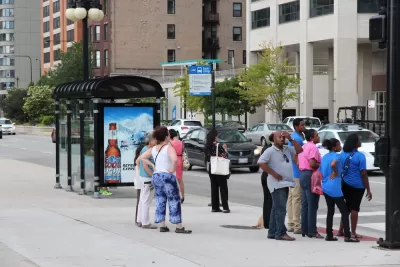Two companies focusing on hyper-local trips want to bring more transit and services within reach of Chicago’s underserved Black neighborhoods.

Two Black-owned Chicago companies want to use on-demand transportation to fill critical gaps in the city’s transit infrastructure. As Audrey F. Henderson writes in NextCity, Jitney EV and GEST are harking back to the informal jitneys that served Black residents when white cab companies often wouldn’t. Now, the two companies hope to bring electric, on-demand transportation to some of Chicago’s most underserved neighborhoods.
The services are not meant to compete with long-distance transportation to places like the city’s airports or suburbs. Rather, they’re designed to provide the short trips that many taxi and ride-hailing operators don’t want to make. “Their efforts are specifically targeting the ‘last mile’ gap between public transit stops and destinations such as grocery stores, banks and entertainment, along with providing an option for reliable transportation to and from work for residents within its service area,” said William “Billy” Davis, general manager for Jitney EV.
While it could be argued that more car-based services, even electric ones, could add to congestion, the companies argue that “Hyperlocal services could be a key factor in the ultimate goal of not only eliminating gasoline vehicles, but of reducing dependence on cars in the first place.” Meanwhile, free rides can connect more residents to jobs and essential services without the burden of transit costs.
FULL STORY: Black-Owned Companies Seek To Close Chicago’s Electric Transportation Gaps

Maui's Vacation Rental Debate Turns Ugly
Verbal attacks, misinformation campaigns and fistfights plague a high-stakes debate to convert thousands of vacation rentals into long-term housing.

Planetizen Federal Action Tracker
A weekly monitor of how Trump’s orders and actions are impacting planners and planning in America.

In Urban Planning, AI Prompting Could be the New Design Thinking
Creativity has long been key to great urban design. What if we see AI as our new creative partner?

King County Supportive Housing Program Offers Hope for Unhoused Residents
The county is taking a ‘Housing First’ approach that prioritizes getting people into housing, then offering wraparound supportive services.

Researchers Use AI to Get Clearer Picture of US Housing
Analysts are using artificial intelligence to supercharge their research by allowing them to comb through data faster. Though these AI tools can be error prone, they save time and housing researchers are optimistic about the future.

Making Shared Micromobility More Inclusive
Cities and shared mobility system operators can do more to include people with disabilities in planning and operations, per a new report.
Urban Design for Planners 1: Software Tools
This six-course series explores essential urban design concepts using open source software and equips planners with the tools they need to participate fully in the urban design process.
Planning for Universal Design
Learn the tools for implementing Universal Design in planning regulations.
planning NEXT
Appalachian Highlands Housing Partners
Mpact (founded as Rail~Volution)
City of Camden Redevelopment Agency
City of Astoria
City of Portland
City of Laramie




























